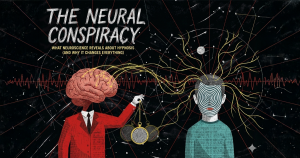Main Character Syndrome (MCS) is a modern phenomenon where individuals perceive themselves as the central figure in their life narrative, often influenced by social media and self-presentation online. This article explores how hypnotherapy, particularly the innovative techniques offered by Joymind’s Hypnotherapy and Coaching, can help individuals identify and overcome MCS. The impact of social media is analyzed through existing literature, including recent studies on parasocial relationships, self-presentation, and social comparison. We also delve into Dr. Michael Glock’s 3-Step Method, which provides a structured approach to reorient oneself toward authenticity and genuine connections with others.
Introduction
In today’s digital era, social media platforms encourage individuals to curate their self-image, often portraying themselves as the “main character” in their own stories. While self-expression can be empowering, an excessive emphasis on self can lead to Main Character Syndrome (MCS), characterized by self-centered narratives and a lack of genuine connections (Klosowski, 2021). Research suggests that social media plays a significant role in shaping self-perception, amplifying tendencies toward MCS (Orehek & Human, 2017). Hypnotherapy, as practiced by Joymind’s Hypnotherapy and Coaching, offers a pathway to recognize and address these tendencies. This article examines how hypnotherapy can be instrumental in identifying MCS and introduces Dr. Glock’s 3-Step Method for fostering an authentic self.
Understanding Main Character Syndrome
Defining Main Character Syndrome
Main Character Syndrome is not a clinical diagnosis but a cultural phenomenon where individuals perceive themselves as protagonists in a story, often minimizing the roles and experiences of others (Klosowski, 2021). This mindset can manifest as a constant need for attention, a tendency to dominate conversations, and difficulty empathizing with others.
The Role of Social Media in MCS
Social media platforms facilitate self-presentation, allowing individuals to showcase idealized versions of themselves. Studies reveal that social media use can reinforce self-centric narratives, especially when positive feedback strengthens users’ self-image (Orehek & Human, 2017). Platforms like Instagram and Twitter have been associated with increased self-presentation and parasocial relationships, contributing to MCS (Bond, 2016; Barberis et al., 2023).
The Impact on Relationships and Self-Perception
Individuals with MCS may struggle to form deep, meaningful relationships due to their self-centric worldview. This can lead to feelings of isolation and dissatisfaction, as genuine connections are replaced with superficial interactions focused on self-promotion (Sevilla, 2021). Moreover, reliance on social media for validation can affect mental health and hinder alternative help-seeking behaviors (Gere et al., 2020).
The Role of Hypnotherapy in Identifying MCS
Hypnotherapy as a Tool for Self-Discovery
Hypnotherapy involves guided relaxation and focused attention to access the subconscious mind. This therapeutic approach can uncover underlying thoughts and beliefs contributing to MCS, enabling individuals to address these patterns effectively (American Psychological Association, 2014). By tapping into the subconscious, clients can gain insight into how social media and self-presentation influence their self-perception and interactions with others.
Joymind’s Hypnotherapy and Coaching Approach
Joymind’s Hypnotherapy and Coaching specializes in personalized treatment plans that address the unique experiences of each client. By utilizing hypnotherapy, Joymind’s practitioners help individuals explore their subconscious mind, identify MCS tendencies, and foster personal growth. Their approach considers the impact of social media on self-perception and aims to reframe thought patterns toward authenticity (Glock, n.d.-a).
Introducing Dr. Glock’s 3-Step Method
Dr. Michael Glock’s 3-Step Method offers a structured approach to transition from a self-centered mindset to one of authenticity and genuine connection (Glock, n.d.-a). This method integrates hypnotherapy techniques with insights from social science foresight methodologies (Glock, n.d.-b).
-
Awareness and Acceptance
The first step involves recognizing the presence of MCS in one’s life. Through hypnotherapy, individuals gain heightened awareness of their thoughts and behaviors, allowing them to accept the need for change. Understanding how self-presentation on social media contributes to self-perception is crucial (Orehek & Human, 2017). -
Reframing Thoughts and Beliefs
Once aware, individuals can challenge and reframe the thought patterns sustaining MCS. This involves shifting from a narrative where one is always the focus to a more balanced perspective that values others’ contributions. Studies indicate that reframing feedback from social media interactions can support genuine self-confidence rather than reinforcing a self-centered image (Bond, 2016). -
Integration and Practice
The final step focuses on integrating new perspectives into daily life. Clients practice empathy, active listening, and other interpersonal skills that promote authentic connections. Recognizing the role of social media as a tool rather than a measure of self-worth is emphasized (Barberis et al., 2023).
Benefits of Reorienting Toward Authenticity
Enhanced Interpersonal Relationships
Overcoming MCS allows individuals to build stronger relationships based on mutual respect and understanding. Emphasizing genuine interactions leads to deeper connections with others (Sevilla, 2021). By shifting focus from self-presentation to authentic engagement, individuals can experience more fulfilling social interactions (Orehek & Human, 2017).
Improved Mental Well-being
Reducing self-centered narratives can alleviate stress and anxiety associated with maintaining a façade. Embracing authenticity promotes inner peace and self-acceptance (Wetter, 2021). Recognizing social media’s impact on mental health can encourage healthier coping mechanisms and reduce reliance on external validation (Gere et al., 2020).
Personal Growth and Fulfillment
Shifting focus from oneself to include others opens the door to new experiences and perspectives, fostering personal development and a greater appreciation for life’s complexities. Positive feedback becomes a means of mutual encouragement rather than self-validation (Bond, 2016).
Conclusion
Main Character Syndrome can subtly infiltrate our lives, impacting relationships and overall well-being, often exacerbated by the influence of social media on self-perception. However, it is possible to overcome these tendencies and rediscover your authentic self. Hypnotherapy, particularly the specialized services offered by Joymind’s Hypnotherapy and Coaching, provides a powerful tool for self-discovery and transformation. By embracing Dr. Michael Glock’s 3-Step Method, individuals can reorient their mindset, foster genuine connections, and lead more fulfilling lives (Glock, n.d.-a).
References
American Psychological Association. (2014). Hypnosis for the Treatment of Clinical Problems: A Comprehensive Guide. APA. https://www.apa.org/pubs/books/4317205
Barberis, N., Sanchez-Ruiz, M., Cannavò, M., Calaresi, D., & Verrastro, V. (2023). The Dark Triad and Trait Emotional Intelligence as Predictors of Problematic Social Media use and Engagement: The Mediating Role of the Fear of Missing Out. Current Neuropharmacology, 21(3), 205-214. https://dx.doi.org/10.36131/cnfioritieditore20230205
Bond, B. J. (2016). Following your “friend”: Social media and the strength of adolescents’ parasocial relationships with media personae. Cyberpsychology, Behavior, and Social Networking, 19(11), 656-660. https://dx.doi.org/10.1089/CYBER.2016.0355
Cao, M., Li, J., Shao, E., & Zhang, W. (2023). Analyzing the phenomenon of self-presentation content on social media platforms. E-Wa Publishing, 3(1), 50-65. https://doi.org/10.54254/2753-7048/3/2022551
Gere, B., Salimi, N., & Anima-Korang, A. (2020). Social media use as self-therapy or alternative mental help-seeking behavior. The IAFOR Journal of Psychology & the Behavioral Sciences, 5(2), 20-35. https://doi.org/10.22492/ijpbs.5.2.02
Glock, M. (n.d.-a). Joymind Hypnotherapy and Coaching. Joymind. https://joymind.com/
Glock, M. (n.d.-b). Cultural Futuristics: A Social Science Foresight Methodology. Academia.edu. https://www.academia.edu/10728716/CULTURAL_FUTURISTICS_A_SOCIAL_SCIENCE_FORESIGHT_METHODOLOGY
Klosowski, T. (2021, May 12). How to stop being the main character. The New York Times. [https://www.nytimes.com/2021/05














